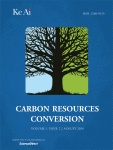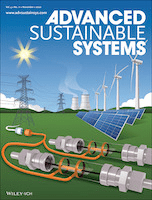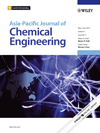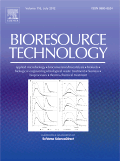
Carbon Resources Conversion
Scope & Guideline
Empowering Sustainable Energy through Carbon Innovation
Introduction
Aims and Scopes
- Carbon Conversion Technologies:
The journal emphasizes advanced technologies for converting various carbon sources, including biomass, waste, and fossil fuels, into valuable products such as fuels, chemicals, and materials. - Sustainable Materials Development:
Research on the development of sustainable materials, particularly those derived from carbon resources, is a core focus, including studies on activated carbons, biochar, and nanocomposites. - Environmental Impact and Remediation:
The journal covers studies related to the environmental implications of carbon resource conversion, including waste management, pollution control, and the development of green technologies. - Catalysis and Reaction Engineering:
A significant emphasis is placed on catalysis and reaction engineering methodologies that enhance the efficiency and selectivity of carbon conversion processes. - Bio-based and Renewable Resources:
Research exploring the valorization of bio-based resources and the integration of circular economy principles is a key area, with a focus on converting organic waste into useful products.
Trending and Emerging
- Green Chemistry and Sustainable Practices:
There is a notable increase in research focusing on green chemistry approaches, including the development of environmentally friendly catalysts and processes that minimize waste and energy use. - Carbon Capture and Utilization (CCU):
Recent publications show a growing interest in carbon capture technologies and their utilization in the production of fuels and chemicals, which is critical for addressing climate change. - Biomass and Waste Valorization:
Emerging research themes include the conversion of biomass and various waste materials into valuable products, highlighting the importance of circular economy practices. - Advanced Materials for Energy Applications:
There is a rising trend in the development of advanced carbon-based materials for energy storage and conversion applications, including supercapacitors and battery technologies. - Microbial and Enzymatic Processes:
The journal has seen an increase in studies exploring microbial and enzymatic processes for the conversion of carbon resources, emphasizing biotechnological innovations.
Declining or Waning
- Traditional Fossil Fuel Research:
Research specifically focused on traditional fossil fuel conversion processes has been decreasing, likely due to a greater emphasis on renewable and sustainable alternatives. - Conventional Waste Management Techniques:
Papers centered on conventional waste management strategies are appearing less frequently as the journal pivots towards innovative, sustainable waste valorization methods instead. - Non-renewable Carbon Feedstocks:
The exploration of non-renewable carbon feedstocks for conversion processes is waning, reflecting an industry-wide shift towards renewable and sustainable carbon sources. - Basic Theoretical Studies:
The journal has seen a decline in the publication of purely theoretical studies without practical applications, as there is a growing demand for research that has direct implications for technology and sustainability.
Similar Journals

ACS Engineering Au
Empowering Sustainable Solutions in EngineeringACS Engineering Au, published by the American Chemical Society, is an esteemed open-access journal dedicated to advancements in the field of engineering, encompassing a wide range of interdisciplinary studies that merge principles of chemistry with cutting-edge engineering practices. With an E-ISSN of 2694-2488, this journal aims to disseminate significant and innovative research findings that contribute to the development of sustainable technologies and solutions in various engineering domains. Since becoming an open-access journal in 2021, it has fostered greater accessibility and visibility for researchers and practitioners alike, encouraging collaboration and knowledge sharing across the global community. By providing a platform for high-quality research, ACS Engineering Au plays a pivotal role in shaping the future of engineering disciplines, making it an essential resource for academics, industry professionals, and students who are eager to stay at the forefront of engineering advancements.

Carbon Capture Science & Technology
Exploring New Frontiers: The Science Behind Carbon Capture TechnologiesCarbon Capture Science & Technology, published by Elsevier, is an esteemed, peer-reviewed, open access journal dedicated to advancing research in the growing fields of chemical engineering, energy, and environmental science. With an ISSN of 2772-6568, this influential journal has established itself since its inception in 2021 and continues to make notable contributions, reflected in its impressive Q1 rankings across multiple categories, including a #14 rank in Environmental Science and a #13 rank in Chemical Engineering as of 2023. The journal aims to provide a platform for the dissemination of innovative carbon capture technologies and methodologies that address vital climate challenges, ensuring broad accessibility for researchers, professionals, and students alike. By embracing open access, Carbon Capture Science & Technology fosters a collaborative approach to knowledge sharing, making it an indispensable resource for those committed to sustainability and environmental preservation.

Advanced Sustainable Systems
Elevating Sustainability Research to New HeightsAdvanced Sustainable Systems is a premier academic journal published by WILEY-V C H VERLAG GMBH, dedicated to the dynamic fields of environmental science and renewable energy. With an ISSN of 2366-7486, this journal has rapidly established its significance within the scientific community, achieving a prestigious Q1 ranking in both Environmental Science (miscellaneous) and Renewable Energy, Sustainability and the Environment categories as of 2023. Spanning the converged years from 2017 to 2024, it serves as a vital platform for researchers and practitioners alike, facilitating the dissemination of innovative ideas and groundbreaking research that drive sustainability initiatives globally. Although not an Open Access publication, its contributions are invaluable, reflected by its commendable Scopus rankings—#28 out of 233 in General Environmental Science and #49 out of 270 in Renewable Energy. As we face pressing environmental challenges, Advanced Sustainable Systems remains at the forefront, championing research that informs and influences sustainable practices and policies across the globe.

Carbon Energy
Leading the charge in carbon energy research and innovation.Welcome to Carbon Energy, an esteemed open-access journal published by WILEY that focuses on cutting-edge research in the field of energy and materials science. Since its inception in 2019, this journal has quickly established itself as a leading platform for disseminating impactful findings and innovations related to carbon-based energy solutions, renewable resources, and sustainability practices. With its impressive Q1 rankings in multiple categories—including Energy (miscellaneous), Materials Chemistry, and Renewable Energy—Carbon Energy is recognized for delivering high-quality, peer-reviewed content that meets the rigorous standards of the academic community. Through its open-access model, the journal ensures wide accessibility of research findings, making it an invaluable resource for researchers, professionals, and students alike. As we look toward the future, Carbon Energy aims to further its mission of advancing sustainable energy technologies and promoting interdisciplinary collaboration in tackling global energy challenges.

Asia-Pacific Journal of Chemical Engineering
Shaping Tomorrow's Innovations in the Asia-Pacific Region.The Asia-Pacific Journal of Chemical Engineering, published by WILEY, serves as a vital forum for the dissemination of innovative research in the interdisciplinary domains of chemical engineering, renewable energy, sustainability, and waste management. Established in 2006, this esteemed journal has achieved a notable impact factor that reflects its commitment to advancing knowledge and practices within the chemical engineering community. With its Q3 category rankings across various fields, including Chemical Engineering (Miscellaneous), Renewable Energy, Sustainability and the Environment, and Waste Management and Disposal, the journal holds a significant position among its peers, assuring readers of quality and relevance in published content. Although it does not offer Open Access options, the Asia-Pacific Journal of Chemical Engineering remains an essential resource for researchers, professionals, and students aiming to stay at the forefront of innovations affecting the Asia-Pacific region and beyond. The journal's broad scope covers diverse topics, making it an integral part of the academic landscape from 2006 to 2024.

Catalysts
Innovating Catalytic Solutions for Tomorrow's ChallengesCatalysts is a leading academic journal in the field of catalysis, published by MDPI since 2011 and well-regarded for its commitment to open access publishing. Based in Switzerland, this journal delivers innovative research and reviews that span various aspects of catalysis, from heterogeneous and homogeneous catalysis to the development of novel catalytic systems. With a commendable impact factor and a notable Q2 ranking in both Catalysis and Physical and Theoretical Chemistry categories, Catalysts plays a critical role in advancing the scientific discourse in these fields. The open-access model ensures that all research articles are readily accessible to researchers and professionals worldwide, fostering collaboration and accessibility to high-quality scientific literature. As the journal continues to publish cutting-edge studies up to its convergence in 2024, it remains an essential resource for anyone involved in catalysis research, from seasoned professionals to emerging scholars.

Solid Fuel Chemistry
Pioneering Research in Solid Fuel ChemistrySolid Fuel Chemistry is a pivotal journal published by PLEIADES PUBLISHING INC, dedicated to advancing knowledge in the fields of chemical engineering, chemistry, and fuel technology. With its ISSN 0361-5219 and E-ISSN 1934-8029, this esteemed publication has been contributing to the scientific community since its inception, covering extensive research from 1975 to 2024. Operating within the Q3 and Q4 quartiles, it holds a significant position among peers in its categories, ranked 94th in Energy & Fuel Technology and 212th in General Chemical Engineering. Although it lacks an open access option, the journal remains a vital resource for researchers, professionals, and students eager to explore innovative developments in solid fuels and their applications. The articles published in Solid Fuel Chemistry provide essential insights, facilitate collaboration, and inspire further research, making it an indispensable platform for anyone engaged in this essential field of study.

Fuels
Transforming Energy Challenges into Sustainable SolutionsFuels is a premier open-access journal published by MDPI, focusing on the multifaceted field of fuel science, technology, and applications. Since its inception in 2020, this journal (E-ISSN: 2673-3994) has rapidly become a vital resource for researchers, professionals, and students engaged in the exploration of sustainable fuel alternatives, combustion technologies, and energy conversion processes. Located in Basel, Switzerland, Fuels aims to disseminate high-quality research that not only advances academic understanding but also addresses real-world energy challenges. By embracing an open-access format, it ensures that significant findings are readily available to the global scientific community, helping to foster collaboration and innovation in the transition to cleaner energy solutions. With an emphasis on interdisciplinary research and practical applications, Fuels is poised to be a leading journal that shapes the future of energy technologies.

Green Chemical Engineering
Transforming chemical engineering with eco-friendly insights.Green Chemical Engineering, an esteemed journal published by KEAI PUBLISHING LTD, plays a pivotal role in advancing the field of sustainable chemical engineering. With an Open Access policy since 2020, this journal facilitates the free exchange of cutting-edge research and innovations that address critical environmental challenges. Based in China, it has rapidly gained recognition with impressive category quartiles, ranking Q1 in numerous relevant fields including Catalysis, Chemical Engineering (miscellaneous), Filtration and Separation, and Process Chemistry and Technology. Its presence in Scopus highlights its significance, with top rankings (e.g., Rank #4/19 in Filtration and Separation) placing it in the upper echelons of chemical engineering literature. Designed for researchers, professionals, and students alike, Green Chemical Engineering aims to foster a collaborative platform for the dissemination of pioneering work that contributes to a greener and more sustainable future.

BIORESOURCE TECHNOLOGY
Catalyzing Research for a Sustainable FutureBioresource Technology, published by Elsevier Science Ltd, is a leading journal in the fields of bioengineering, environmental engineering, and sustainable resource management. With an impressive impact factor reflected in its Q1 rankings for 2023 across multiple relevant categories, it stands out as a premier source for groundbreaking research from its inception in 1991 to its anticipated contributions through 2024. Bioresource Technology promotes the advancement of technologies and methodologies aimed at the sustainable utilization of biological resources, playing a pivotal role in tackling the challenges of waste management, renewable energy, and environmental protection. Researchers and practitioners are encouraged to contribute and engage with high-quality studies that have significant implications for the global push towards sustainability and innovation. Although the journal does not currently offer Open Access, its subscription model ensures that the rigorous peer-reviewed content remains accessible to those dedicated to advancing the field.